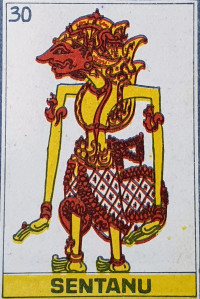Wayang Sentanu
The Tragic King of Hastinapura.
Within the grand narrative of the Mahabharata, Sentanu (also known as Shantanu) holds a position of tragic significance as the King of Hastinapura. While a figure of power and nobility, his choices driven by desire ultimately lay the groundwork for the conflicts that consume the epic. Wayang kulit performances likely portray Sentanu with a mixture of regal bearing and underlying sorrow, embodying the complexities of his character.

Sentanu's Story
Sentanu's tale is one of love, sacrifice, and unintended consequences. He becomes enthralled with Satyavati, a beautiful woman with a unique condition: anyone she marries will inherit the throne, excluding Sentanu's rightful heir, his devoted son Devavrata (later known as Bhishma). Bhishma, out of unwavering love for his father, renounces his claim to the throne and vows eternal celibacy, making way for Sentanu's marriage.
Consequences of Love
While Sentanu gains his heart's desire, his choice has far-reaching implications. Bhishma's extraordinary sacrifice leaves the line of succession uncertain. Furthermore, Satyavati's sons prove less virtuous than Bhishma. These factors contribute to the bitter rivalry between the descendants of the house – the Pandawas and the Kurawas – and the eventual Kurukshetra War.
Symbolism in Wayang
In wayang kulit, Sentanu likely represents:
The Seduction of Desire: His initial captivation by Satyavati highlights the power of desire, even when it risks disrupting the natural order.
Fatherly Love: His affection for Bhishma is likely portrayed sympathetically, yet his ultimate inability to protect Bhishma from the consequences of his own actions adds a tragic dimension.
Unintended Consequences: Sentanu becomes a symbol of how seemingly well-intentioned choices can have unforeseen and destructive consequences.
Interpretations in Performance
The dalang (puppet master) has significant room to interpret Sentanu's character. Some portrayals might focus on his initial strength and nobility, gradually tainted by weakness in the face of desire. Others might emphasize his deep sadness, caught between love for his son and his own longings.
Wayang Sentanu serves as a reminder of the complexities of human desire and the far-reaching impact our choices can have, even when made with loving intentions. He demonstrates that even kings and heroes can be bound by their flaws, leaving behind a legacy of both greatness and tragedy.
Last updated